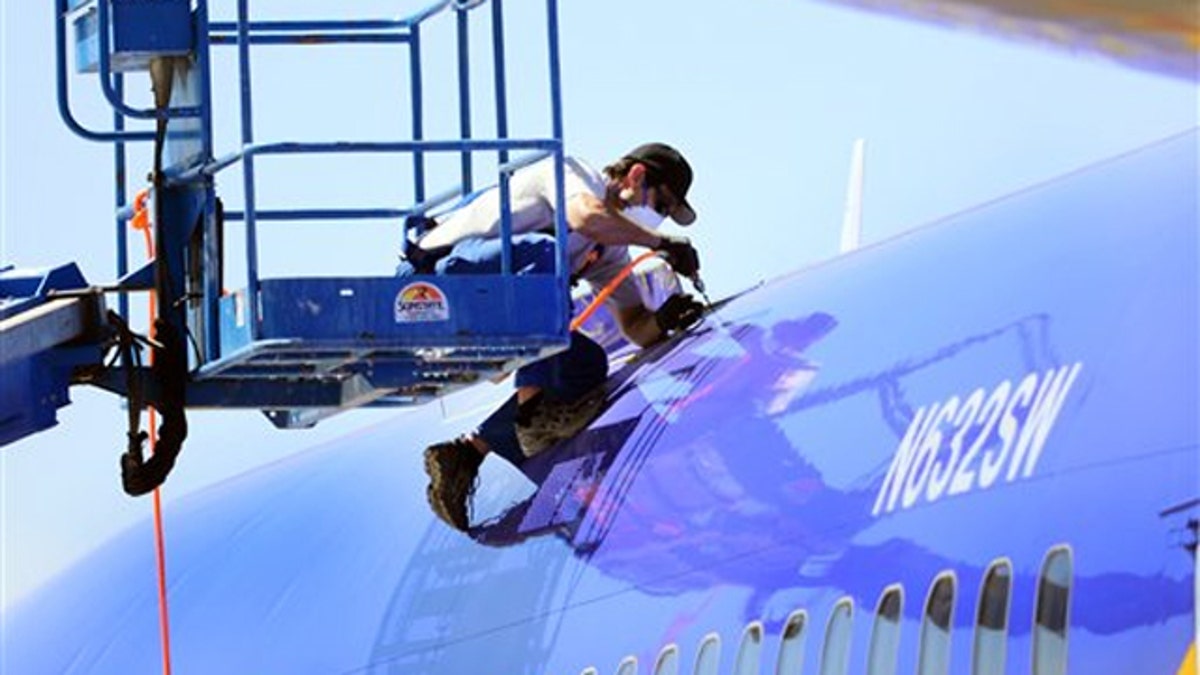
A member of the National Transportation Safety Board investigating the emergency landing of Southwest Airlines flight 812 cuts away a portion of the plane's fuselage on April 3 in Yuma, Ariz. (AP)
With airlines and regulators under the microscope after the fuselage of a Southwest flight tore open last weekend, new concerns are being raised about the quality of the work being done at hundreds of overseas repair shops.
Southwest Airlines, like other major carriers, gets some of its maintenance and repair done at overseas stations. The company said the Boeing 737 that was forced to make an emergency landing after a hole blew open shortly after takeoff was not serviced at Aeroman -- the facility in El Salvador where Southwest has its heavy maintenance done. But a number of other planes are being serviced overseas every day, raising questions about whether federal regulators are doing enough to monitor the quality of the work.
The Transport Workers Union of America just released a report calling for new rules at overseas repair shops, claiming "hundreds of millions of airline passengers have no way of knowing when or where the aircraft they are flying on has been maintained or repaired, or under what conditions." The report said U.S.-based airlines are sending an "increasing proportion" of their planes to China, Mexico, Chile and other countries for repairs - and that the facilities don't require certain kinds of background checks for workers and that the Federal Aviation Administration doesn't have enough inspectors to check up regularly on those facilities.
Bob Zimmerman, with the union, said some critical work is done at those stations.
"When you pull an airplane apart and do an airframe inspection on it, you can walk -- literally walk -- into the cabin of that airplane and see the ground. That's how far they disassemble the airplane. When they put it back together you need to know it's done right. Because you don't get a chance at 30,000 feet," he said.
The report said the FAA has just 100 inspectors for 700 repair stations outside the United States, compared with 4,000 inspectors for 4,200 domestic repair stations.
But FAA spokesman Les Dorr said the agency also has inspectors assigned to individual carriers who can head overseas to check up on those shops. The FAA disputed the claim that the overseas stations are more lax than domestic ones.
"It really doesn't matter whether work is done at a domestic repair station or an overseas repair station," Dorr said. "(Workers) have to meet exactly the same qualifications. ... The work has to be done according to the airline's maintenance program."
The FAA said station inspectors perform at least one "comprehensive" inspection every year, in addition to the inspections performed by carrier inspectors and the air carriers themselves.
Southwest said in a statement that the El Salvador facility it uses adheres to "rigorous safety and quality standards." The company said its on-site workers at maintenance shops ensure its planes are worked on according to proper standards.
The company said 85 percent of its maintenance work is performed in the United States.
But John Goglia, former member of the National Transportation Safety Board, said that, overall, about 52 percent of maintenance and repair work is being done outside the United States.
"I'm concerned about the qualifications of the people who do this work in those foreign countries.
But I'm also concerned about the oversight that U.S. carriers are providing for that work," he said.
He said FAA inspectors can do spot checks on any domestic facility but that overseas, they need to call in advance - often weeks in advance - to set up an appointment.
"They're doing the work in accordance with required procedures. But we see time after time, incidents where it just doesn't happen," he said.
Speaking on Capitol Hill Wednesday, FAA Administrator Randy Babbitt stressed that the agency wants to ensure the flying public feels safe when they leave the tarmac.
He cited a new FAA directive ordering extra inspections on older Boeing 737s, and suggested more changes could be on the way.
"I've asked the team to look at this. Are we collecting the right data? Are we ... asking the rights questions? Are we testing the right things? Because we do have an aging fleet of aircraft? We want to make certain and we want to make sure that the traveling public is comfortable that these aircraft are safe," he said.
He said the investigation continues into what caused the rupture on the Southwest flight but said the agency has "no suspicion that they have done anything wrong" in terms of compliance.
Southwest has had run-ins with the FAA before, and Babbitt said they have since "completely revamped their maintenance operations, and we're very comfortable."
Southwest says the plane in question had "no outstanding maintenance items."
FoxNews.com's Judson Berger and Fox News' Doug McKelway contributed to this report.





















